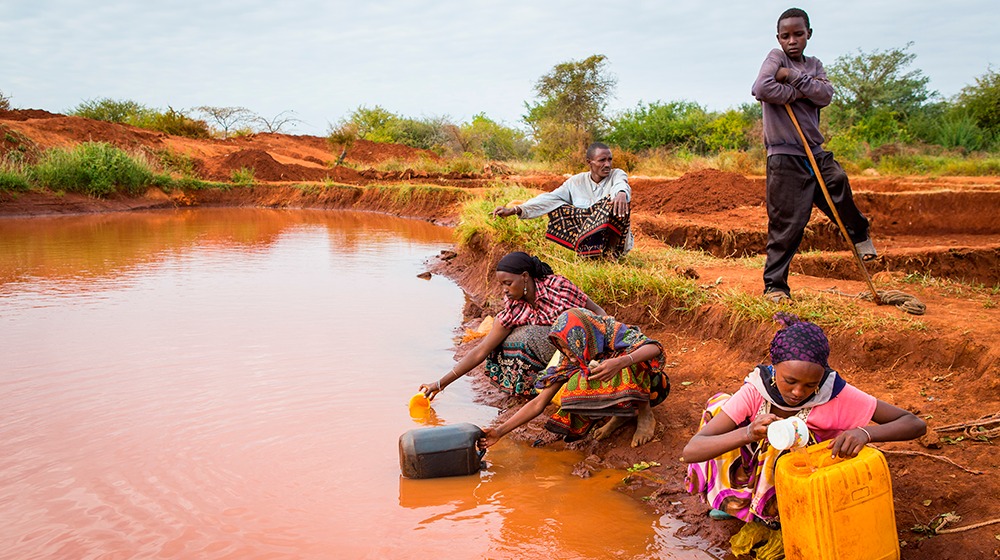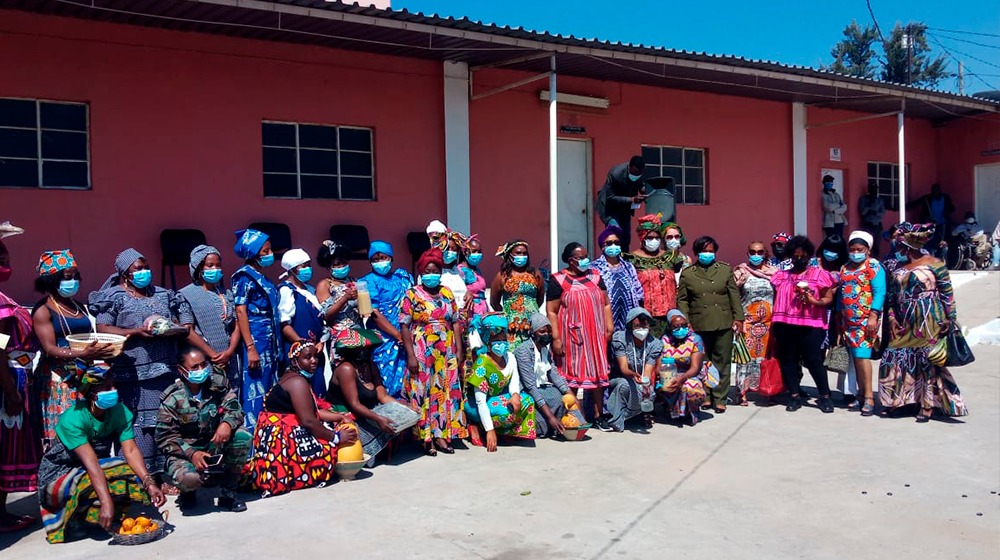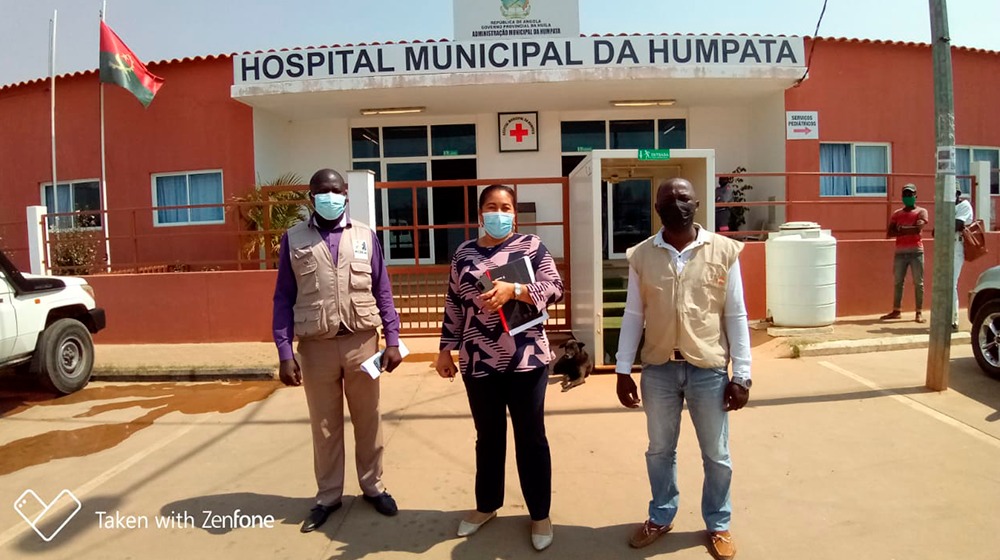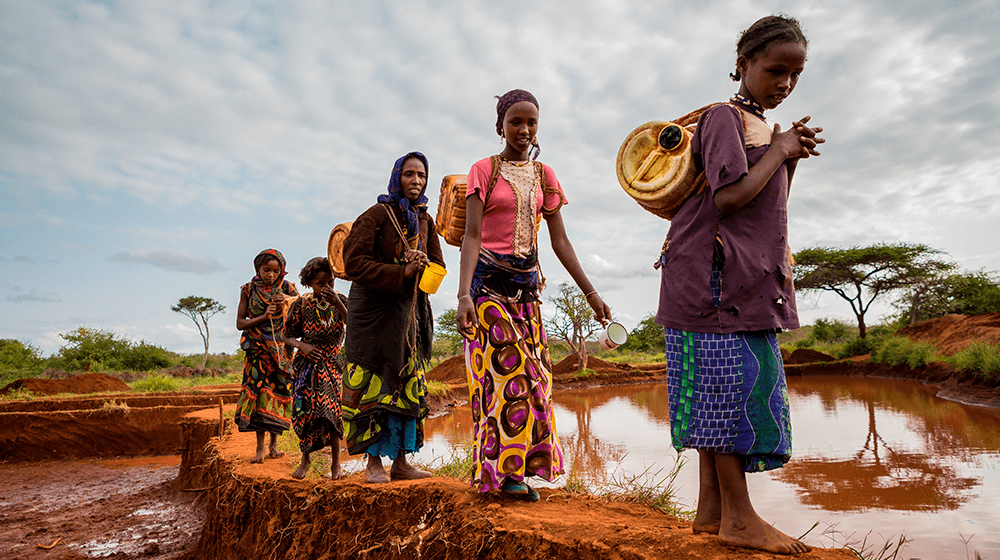UNFPA distributes dignity kits to combat the humanitarian crisis in southern Angola
The humanitarian crisis caused by the drought in southern Angola does not only have the face of hunger. One of the silent and equally serious crises is the impact it is having on the sexual and reproductive health of millions of girls and women in the region. UNFPA, together with the World Bank and the Angolan Ministry of Health (MINSA) began the distribution of 50,000 dignity and sexual health kits in the provinces of Huila, Cunene, Namibe and Cuando-Cubango, as the worst-affected provinces.

The drought in southern Angola shows no signs of mercy. The situation becomes more serious by the day. Six million people are at food risk, according to the World Food Program. Cattle are dying and there are reports of hundreds of Angolans crossing the border to Namibia in search of better living conditions. The effect of climate change, together with the difficulties in managing resources by the population, has created a complex situation that is extending for some years and continues to pose major challenges for the social and economic sectors.
Although serious, hunger is just one facet of the problem. This crisis affects every aspect of people's lives, including one that is regularly overlooked — sexual and reproductive health. During crises, women, girls and young adolescents are more vulnerable. It is necessary to take care of them, protect them and guarantee the right to sexual and reproductive health. To this end, UNFPA, the World Bank and MINSA took up letters on the matter.
After a few months of preparation, the Response to Sexual and Reproductive Health in Drought Areas in Southern Angola went out into the field to distribute a total of 50,000 Dignity Kits containing 14 items (3 women's underwear; 1 package with 10 sanitary napkins; 2 soaps; 2 soap dishes; 2 tubes of toothpaste; 1 toothbrush; 1 package of powdered soap; 1 flashlight; 1 1.5m Malongo cloth; 1 pair of slippers; 1 bucket; 1 blue bag; 1 whistle and 1 comb) to the female population of vulnerable communities. In Cuando Cubango, 4,000 kits were delivered on 12 July, destined for the municipalities of Cuangar, Rivungo, Mavinga, Dirico, Nancova, Calai and Cuchi.
The unloading of the kits took place in the warehouses of the Municipal Health Department of Menongue and was attended by Dr. Odete Comboio as Supervisor of the Sexual and Reproductive Health Program.
On July 16, it was the province of Namibe's turn to receive 3,000 kits, in a ceremony that was attended by the Provincial Health Director of the province, Josefa Rebeca Cangombe, and the director of the provincial Office of Social Action, Family and Gender Equality, Maria Natalia Manuel de Carvalho.

in Huíla province. @UNFPA
On July 26, the government of the province of Cunene, represented by the Provincial Vice-Governor for the Social Sector, Dr. Apolo Ndinoulenga, received a total of 17,028 dignity kits, delivered by the team consisting of Mbulandy Wassuka, UNFPA field assistant in Cunene, Benvinda Salomé from the Provincial Health Office in Cunene, Rosa Gaudêncio Bernardo, representative of GASFIG - Office of Social Action Family and Gender Equality and Ms. Teresa, representative of Civil Protection and Firefighters.
In Huíla, the province that received the most, the donation of 26,000 dignity kits took place on 31 July. They will be distributed in the municipalities most affected by the drought – Gambos, Chibia, Cacula, Matala, Quipungo, Humpata and Quilengues. During the delivery of the kits, the local authorities, including the Vice-Governor for the Political, Social and Economic sector, Dr. Maria João Chipalavela, the Director of the Provincial Health Office, Dr. Luciana Guimarães and municipal administrators, got to know more in-depth the UNFPA programs in the field of sexual and reproductive health and some of the actions implemented, with emphasis on the reproductive health kits and prevention materials against Covid-19 to health units in the municipalities in the areas covered by the project.
Emergencies and natural disasters, such as drought in the south of the country, present unique challenges for pregnant women and the development of fetuses and children. The Health Sector Emergency Intervention Plan that MINSA is also carrying out in the four provinces affected by the drought, in partnership with the World Bank and UNFPA, wants to actively support about 350,000 women aged 15 to 49, who are estimated to need sexual and reproductive health services. In this context, there is an urgent need for interventions to reduce maternal and neonatal mortality, prevent the transmission of HIV and cases of gender-based violence and assurance of hygiene dignity of girls and women during menstruation, this is the case with the delivery of Kits of Dignity.

@UNFPA


